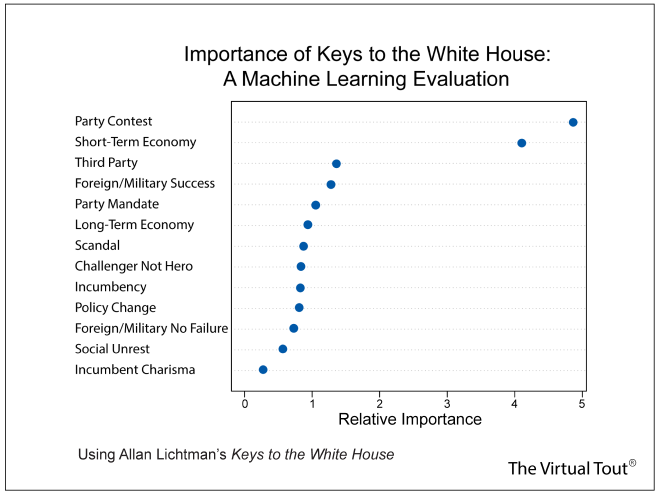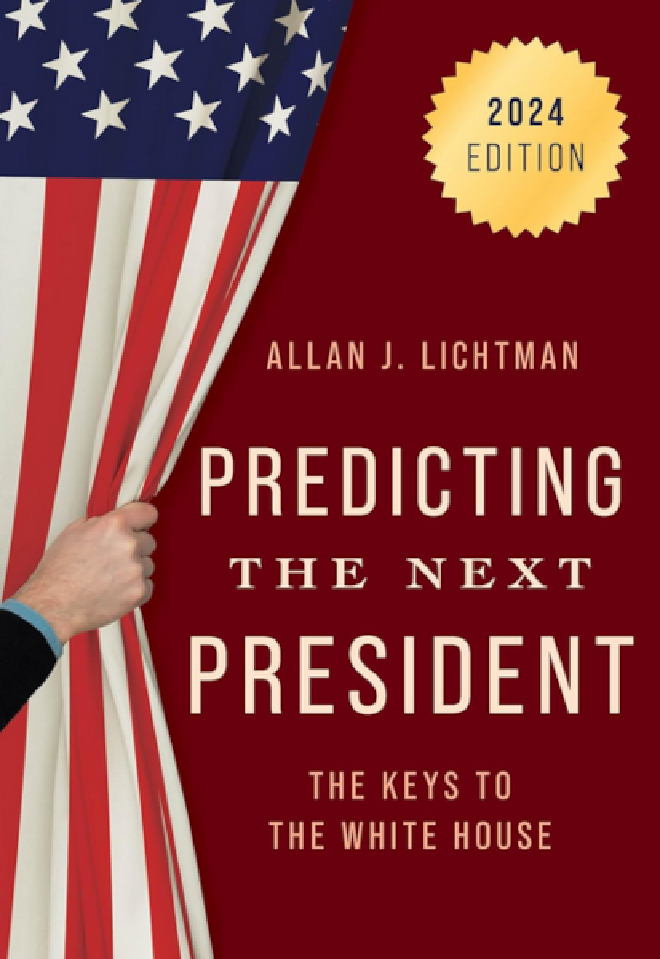Historical Approach to Forecasting
The historian Allan Lichtman (2024) has identified thirteen factors that predict the outcome of US presidential elections. He calls these the “Keys to the White House.”
In an interview from October 5, 2020, Lichtman explained that his keys focus almost entirely on the record of the incumbent party. They do not reflect polls or campaign events. Nor do they concern political messaging or debate performance. Furthermore, Lichtman treats all thirteen keys as equally important.
Prior to the 2020 presidential election, we fit a random forest classification model to Lichtman’s data across forty presidential elections (1860 through 2016). This machine learning model could then be used to predict the probability of a challenger winning against a candidate from incumbent party. The random forest model also provided an assessment of the relative importance of the thirteen keys or factors, as shown in this figure.

We can see that party contest is the most important key, and incumbent charisma is the least important key.
The random forest model based on Lichtman’s Keys to the White House provided a clear prediction of the 2020 election outcome (as defined by winning or losing in the Electoral College): The challenger Joe Biden had a 62.4% chance of winning against the incumbent candidate Donald Trump.
This prediction from our random forest model was consistent with Lichtman’s own prediction for the 2020 presidential election, as documented in the Harvard Data Science Review, November 2, 2020: Post-Election Interview with Allan Lichtman.
Learn more about Allan Lichtman’s historical approach to election forecasting at his YouTube Channel.
Lichtman’s Book #

- Lichtman, Allan J. 2024. Predicting the Next President: The Keys to the White House (2024 Edition). Lanham, Maryland: Rowland & Littlefield. [ISBN-13: 978-8881800710] Publisher Link.
Lichtman’s Keys to the White House Ranked by Importance #
| Key Factor | Description |
|---|---|
| Party Contest | (Nomination Contest) There is no serious contest for the incumbent-party nomination. The candidate is nominated on the first ballot and wins at least two-thirds of the delegate votes. |
| Short-Term Economy | The economy is not in recession during the election campaign. The National Bureau of Economic Research has either not declared a recession or has not declared it prior to the election. |
| Third Party | There is no significant third-party or independent campaign (a campaign in which the third-party candidate wins at least five percent of the popular vote). |
| Foreign/Military Success | The incumbent administration achieves a major success in foreign or military affairs. |
| Party Mandate | (Incumbent-Party Mandate) After the midterm elections, the incumbent party holds more seats in the U.S. House of Representatives than it did after the previous midterm elections. |
| Long-Term Economy | Real annual per-capita economic growth during the term equals or exceeds the mean growth during the previous two terms. |
| Scandal | The incumbent administration is untainted by major scandal. There is no broad recognition of a scandal that directly touches upon the president. |
| Challenger Not Hero | (Challenger Charisma) The challenging-party candidate is not charismatic or a national hero. The challenger is not a national hero comparable to Ulysses S. Grant or Dwight D. Eisenhower and is not a charismatic or inspirational candidate comparable to Franklin D. Roosevelt or Ronald Reagan. |
| Incumbency | The incumbent-party candidate is the sitting president (seeking reelection). |
| Policy Change | The incumbent administration effects major changes in national policy. The administration achieves a major policy change during the term comparable to the New Deal or the first-term Reagan Revolution. |
| Foreign/Military No Failure | The incumbent administration suffers no major failure in foreign or military affairs. There is no major failure during the term comparable to Pearl Harbor or the Iran hostage crisis that appears to significantly undermine America’s national interests or threaten its standing in the world. |
| Social Unrest | There is no sustained social unrest during the term. There is no social unrest during the term that is comparable to the upheavals of the post-Civil-War Reconstruction or of the 1960s and that is sustained or raises deep concerns about the unraveling of society. |
| Incumbent Charisma | The incumbent-party candidate is a national hero comparable to Ulysses S. Grant or Dwight D. Eisenhower or is a charismatic or inspirational candidate comparable to Franklin D. Roosevelt or Ronald Reagan. |
Go to Political Research and Forecasting.
Go to the home page of The Virtual Tout.